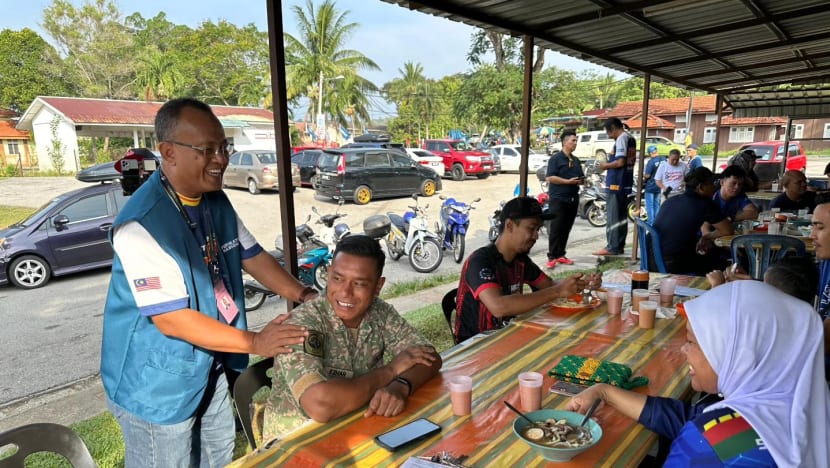Commentary: Rise of ‘birther politics’ in Malaysia and how it might backfire
What was initially a by-election serving as a proxy to test the support for the unity government and Selangor state government has evolved into a classic identity politics poll, says political analyst James Chai.

Pakatan Harapan's Pang Sock Tao (centre) is in a four-cornered battle for the Kuala Kubu Bharu seat in Selangor. (Photo: Facebook/Pang Sock Tao)

This audio is generated by an AI tool.
KUALA LUMPUR: Oddly enough, a by-election contest in the usually quiet scenic town of Kuala Kubu Bharu in Selangor is getting quite a lot of attention.
The four-cornered fight between Pang Sock Tao of Pakatan Harapan (PH), Khairul Azhari Saut of Perikatan Nasional (PN), Hafizah Zainuddin of Parti Rakyat Malaysia and independent candidate Nyau Ke Xin has also given rise to “birther-esque” claims over some of the candidates’ educational background.
It started with a TikTok user questioning the credentials of PN candidate Mr Khairul. The post, which garnered more than half a million views, questioned how Mr Khairul could have obtained a master’s degree just only a year after obtaining his diploma, especially during the COVID-19 lockdown period.
While Mr Khairul and his alma mater, Universiti Malaysia Pahang Al-Sultan Abdullah (UMPSA), came out to confirm his credentials - an executive master’s degree in business management - it opened up an opportunity to question the credentials of PN’s opponent.
Mr Fadhli Shaari, a former PN youth chief and the current information chief for Parti Islam Se-Malaysia (PAS), a PN component party, publicly challenged PH’s Mdm Pang to publicise her primary and secondary school results, specifically the location of the schools.

FACT-FINDING OR ATTACK ON LOYALTY?
At first glance, this appeared like a fact-finding mission to establish the authenticity of their education credentials, as allegations of fake degrees and half-truths have persisted among Malaysian politicians.
However, observers have suggested an alternative motive, positing this as a strategic political tactic targeted specifically at the Democratic Action Party (DAP) candidate, to question her credibility and loyalty to Malaysia. If Mdm Pang went to a vernacular school, took a non-national exam (e.g. Unified Examination Certificate), and/or did not score well in the Malay language, it would imply that she is not an “ideal” candidate.
Remaining silent was not a choice for Mdm Pang, as it would be taken as she had something to hide. She publicised her results in full: Not only did she ace her Malay language subjects, she also took the national entrance exams and was a straight-A student.
After Mdm Pang shared her results, Mr Fadhli apologised for raising questions about her educational background, but added: “This has indirectly revealed that the candidate graduated from vernacular schools ... I hope that this issue will continue until polling day for the by-election.”
This gives rise to the possibility that for PN, it was never about the results, nor was it a fact-finding mission to legally disqualify Mdm Pang from the polls. It creates an impression that they wanted to show that Mdm Pang was an unsuitable candidate because of her background - that she was not “one of us” - even though she was a Malaysian straight-A student who took the national exam.
SHADES OF TRUMP’S “BIRTHER POLITICS”
Research analyst, Aziff Azuddin, described this tactic as similar to Donald Trump’s “birther politics”. As Barack Obama’s popularity surged after the 2004 Democratic National Convention speech, conspiracy theories arose about his place of birth, reportedly started by the columnist Andy Martin.
This issue resurfaced with new falsehoods every few years until it became that Mr Obama was a secret Muslim born in Kenya. It was finally peddled by Donald Trump in 2011, who built his base among conservatives in the Republican Party, propelling him to the presidency in 2017.
Even though Mr Obama’s team shared his birth certificate documents - both short-form and long-form - multiple times to prove his citizenship, the conspiracy theories not only did not dissipate but expanded to other candidates such as US Vice President Kamala Harris and became an issue on major political platforms.
This is because birther politics is never a factual query but an ideological one. It represents a “statement of values”, about a particular notion of allegiance and loyalty to a country.
WILL THE TACTIC BACKFIRE?
The seat in KKB fell vacant after three-term DAP assemblywoman Lee Kee Hiong died on Mar 21 from cancer. Malays make up nearly 50 per cent of the electorate, followed by Chinese (30 per cent) and Indians (18 per cent).
Early voting started on May 7, and polling takes place on May 11.
Though Mr Fadhli may view the questioning of Mdm Pang’s credentials as a clever strategy that successfully trapped her, it may turn out to be a Pyrrhic victory.
DAP, one of four component parties in the PH coalition, understood what Mr Fadhli was trying to do and turned the vernacular education issue on its head by cornering PN to state its official stance.
On this front, PN’s position is surprisingly disadvantageous. Only two months ago, the Federal Court declared vernacular schools constitutional after an unsuccessful challenge by several groups on the vernacular languages as medium of instructions.
The rapid rise of non-Chinese students in vernacular schools - 15.3 per cent Malay and 2.75 per cent Indian - in the past few years have also discounted simplistic race-based criticisms against these schools.
More importantly, it runs against PAS’ off-season courting of non-Muslim votes as its top-down party strategy.
Since the last general election, its leadership, chiefly Dr Halimah Ali, has been tasked to reach out to the urban circles, including the English-language radio station BFM 89.9, to assure voters that PAS is a moderate force.
PAS president Hadi Awang posted about his closeness to the Chinese community during last year’s Chinese New Year, including how his grandfather had adopted many Chinese children and how his daughter-in-law is Chinese. Mr Hadi’s grandchildren reportedly attend vernacular Chinese schools as well.
FAULTS OF AN OLD PLAYBOOK
Mr Fadhli’s strategy has also inadvertently affected Bersatu, Mr Khairul’s party, as the Malay indigenous party was supposed to be the moderating force for PN to appeal to urban centres in the west coast.
DAP took this opportunity to pressure Bersatu president Muhyiddin Yassin to state his stance on vernacular schools, knowing that any answer would put them in a weaker position.
What was initially a by-election serving as a proxy to test the support for the unity government and Selangor state government has evolved into a classic identity politics poll.
Mr Fadhli’s strategy may turn out riskier than initially thought. PN’s decision to not field their non-Malay stand-in party, Gerakan, or a non-Malay candidate in KKB probably already cost them critical non-Malay votes. The seat has never been won by a Malay candidate before. Now this vernacular school tactic might worsen PN’s chances.
The KKB by-election was supposed to be a fail-safe election for PN. It is not the incumbent coalition, and winning one seat would not change the federal and state government.
PN could have used this by-election as an opportunity to win over the non-Malays by attracting protest votes and showcasing its moderate tendencies. Instead, it chose to repeat its old playbook. Whether this turns out to be a costly mistake will be seen in the by-election results.
James Chai is a political analyst, columnist and the author of Sang Kancil (Penguin Random House).


















